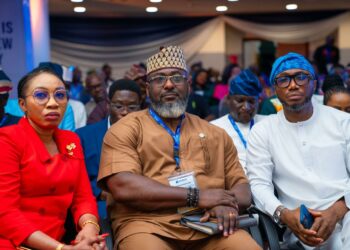The growing quest for a total transformation of the digital economy of the member countries of the Economic Community of West African States (ECOWAS) once again dominated discussion as regional leaders strategise to breach the gender gap in all sectors.
This was the focus of a Town Hall meeting organised by the ECOWAS Female Parliamentarians Association (ECOFEPA) in Abuja recently with the theme “Rejuvenate Democracy by Giving Voice to Women and Youth.”
The National Information Technology Development Agency (NITDA) which is under Nigeria’s Ministry of Communications and Digital Economy keyed into the programme and urged for the expansion of digital skill and capacity building for women and youth in West Africa to breach the gender gap.
Director-general of NITDA, Kashifu Inuwa, buttressed this in his remarks during the opening session of the Town Hall meeting, stressing that the objective can be achieved through the utilisation of innovation and creativity of women and youth who constitute the bulk of the region’s population and also the most marginalised.
Represented by Ikima Musa, the agency’s boss said, “NITDA has taken many steps to drive national prosperity by boosting digital innovation for Nigerian women and youths by creating an enabling environment that maximises their potential and promotes their ability to contribute to the economy.”
According to Inuwa, women and youths are the biggest drivers of innovation, which is considered a vital key to the prosperity of any nation. It is also pertinent to state that market- creating innovations have the potential to not only transform economies but address development and humanitarian challenges.
It can spark innovative and creative solutions that meet needs and promote empowerment, hence the need for an all-inclusive digital economy for West African women through skill development and capacity building.
Although more investment is needed the digital economy is growing in West Africa especially the Information and Communications Technology (ICT) aspect which has added value to the GDP of many countries in the sub region.
There are huge opportunities but there are prospects that if more commitment is made the sector can create life-transforming opportunities for women and youth and create multiple jobs, which is the ultimate goal.
It has also become incumbent on West African leaders to identify the barriers that impede women from utilising and gaining the benefits of their inclusion in IT.
ECOWAS has remained consistent in facilitating the empowerment of women and strengthening the fight against gender-based discrimination through policies and programmes.
The Speaker of the ECOWAS Parliament, Mr Sidie Mohamed Tunis, in his remarks during the ECOFEPA event noted that the Fifth Legislature, under his leadership, had been working to ensure that the voices, aspirations and inclusion of the women and youths in politics and decision-making received regional attention.
He added that the meeting was strategically aligned with the current ECOWAS Vision 2050, which placed more emphasis on women and youths development in the sub-region.
The speaker said it aimed to address some of the issues that had contributed to gender inequalities, adding that the regional economic bloc had recognised the special role of women and youths as actors, agents and beneficiaries of development.
Tunis said that was why the ECOWAS had made concrete commitments and taken tangible actions to ensure the integration of the gender dimension in all planned actions and activities of the parliament.
“Significantly, the allocation of a budget line to ECOFEPA and gender programmes in the parliament’s annual budget, has facilitated the empowerment of women and strengthened the fight against gender-based discrimination, all designed to address inequalities between men and women and to promote gender equality.
“We do not take for granted the critical role women and youths play in advancing gender parity, promoting social diversities and inclusion, holding the executive to account, and drawing attention to specific issues such as the plight of street children, rising youth unemployment and illegal migration.”
President of ECOFEPA, Hon. Woraye Sarr in her statement said it is very crucial for women and youth to have a significant voice in the decision-making table thereby strengthening the efforts against age-long barriers to women emancipation.
While the region aspires to bridge the digital gap, it has become incumbent on all the major stakeholders to increase investment in the sector because it has the potential to create the needed jobs and add value to the regional economy that is still recovering from the devastations of the COVID-19.





